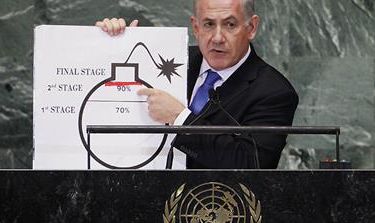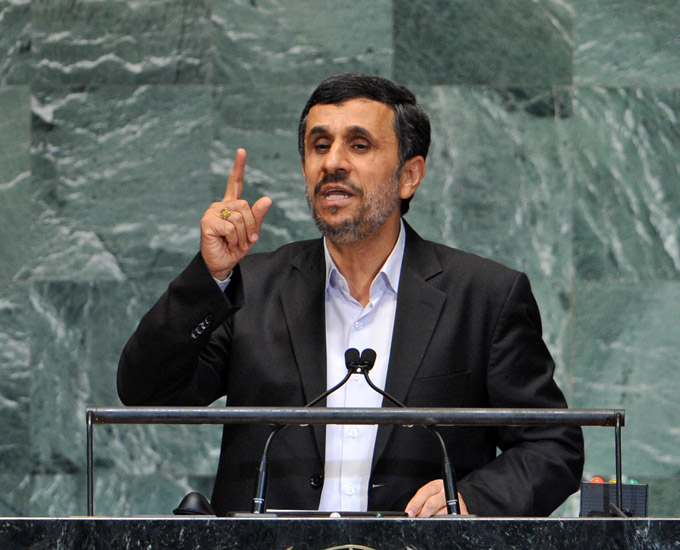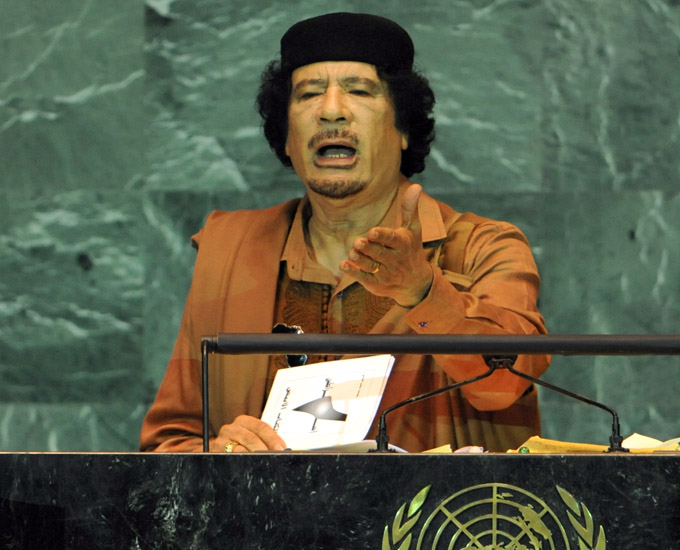UNGA ‘boring’ without colourful characters
Former leaders of Venezuela, Libya and Iran added spice to normally dry speeches on peace and security.

While diplomats traded politely worded barbs over the civil war in Syria at this week’s UN General Assembly, the absence of former Venezuelan President Hugo Chavez, ousted Libyan “king of kings”, and Iran’s last leader Mahmoud Ahmadinejad made the gathering decidedly less colourful than previous meetings.
Speeches at the diplomatic equivalent of Hollywood’s Oscars are normally sombre, pre-scripted affairs where leaders spout platitudes about inclusion, poverty reduction, the need for world peace and other non-controversial topics. Fiery rhetoric, bombastic accusations and strange conspiracy theories are quite rare – an unfortunate fact for the low-level diplomats who have to endure hours of pointless pontificating from various heads of state.
Keep reading
list of 4 itemsPalestinian Prisoner’s Day: How many are still in Israeli detention?
‘Mama we’re dying’: Only able to hear her kids in Gaza in their final days
Europe pledges to boost aid to Sudan on unwelcome war anniversary
Without Chavez referring to the US president as “the devil” or Ahmadinejad using his time in New York to deny the existence of gays in Iran, some long-time UN observers say this year’s summit was considerably less interesting than previous gatherings.
“The personalities this year are remarkably dull and boring, although the issues are anything but,” Thomas Weiss, a former UN official considered one of the leading experts on the international body, told Al Jazeera. “We have rarely had so many important issues on the table simultaneously, starting with Syria, Israel-Palestine, and Afghanistan. The people putting the issues on the table don’t make as good media stories as in the past.
 |
| Mahmoud Ahmadinejad often denounced the West [EPA] |
“Those two acts [Venezuela and Iran] are hard to follow in terms of being flamboyant.”
Let them eat yellow cake
This year, newly inaugurated Iranian President Hassan Rouhani tried to improve his country’s international image, shying away from the hardline and verbose statements of his predecessor.
In 2008, Ahmadinejad alleged that a “small but deceitful number of people called Zionists” were controlling the financial centres of Europe and the US. Rohani made no such claims. Instead he spoke by phone with US President Barack Obama, apparently the first direct contact between presidents of the two countries since Iran’s Islamic Revolution in 1979, and a sign of thawing relations.
Venezuelan President Nicholas Maduro, for his part, stayed away from New York entirely, citing alleged US plots against his life.
Binyamin Netanyahu, Israel’s prime minister, arguably drew more media attention than any other leader with his speech stating: “Iran’s savage record contradicts Rouhani’s soothing statements … He thinks he can have his yellow cake [enriched uranium] and eat it too.”
As US and Iranian leaders push for détente, Israel’s position on the Islamic Republic seems closest to that of the oil-rich Gulf states; Western protectorates who view their larger neighbour as an existential threat to their regimes. Netanyahu did not, however, use this year’s appearance to practice his artistic skills.
‘Dramatic and funny moments’
Last year, the Israeli leader’s crude cardboard drawing of a bomb – used to urge world leaders to take action over Iran’s nuclear programme – drew embarrassment from many diplomats.
I guess this year is boring if you miss the inflammatory comments.
“I remember thinking it looked like a school kid’s drawing,” Ann Cooper, a professor of journalism at Columbia University who spent years covering the UN, told Al Jazeera. “There are all kinds of moments in UN General Assembly history, some of them quite dramatic and some of them funny.”
From former Soviet leader Nikita Khrushchev banging his shoe on the table, railing against US “imperialism”, to Colin Powell’s bogus presentation on Iraq’s non-existent weapons of mass destruction, imagery has often been more prevalent than concrete action at the UN.
Following the Cuban revolution in 1959, a young Fidel Castro eschewed the trappings of the Waldorf Astoria hotel and other posh presidential haunts to spend his time in New York with the people of Harlem.
The late Palestinian leader Yasser Arafat brought his holster (though it contained no gun) to his first UN address in 1974.
Arafat’s protégée, Mahmoud Abbas made an impassioned plea for Palestinian membership to the global body last year. This year, apparently at the request of the US and supposed efforts to kick-start negotiations with Israel, Abbas stayed relatively silent.
Sudan’s president, Omar al-Bashir, once claimed that allegations of genocide in Darfur were an attempt by Zionists and Western aid agencies to discredit his regime. Facing an indictment for genocide by the International Criminal Court, Bashir didn’t show up in New York this year.
During his first visit to the US in 2009, Libya’s ousted leader, Muammar Gaddafi, tore up a copy of the UN charter during his address to the General Assembly, which lasted six times longer than his allotted time, causing a translator to break down with exhaustion.
He peppered criticisms of the US with praise for Barack Obama, dubbing him a “son of Africa” – to the US president’s chagrin – and demanded investigations into the assassinations of John F Kennedy and Martin Luther King.
 |
| Former Libyan leader Muammar Gaddafi spoke for more than 90 minutes at UNGA in 2009 [EPA] |
“It shouldn’t be called the [UN] Security Council, it should be called the terror council,” the self-proclaimed “king of kings” said of the body’s five permanent members.
‘Inconsequential headlines’
“I guess this year is boring if you miss the inflammatory comments,” Cooper quipped, “But frankly, I think it’s kind of exciting to see some good signs for the possibility for diplomacy,” she said, citing a deal to destroy Syria’s chemical weapons and warming ties between Iran and the US.
Analysts are undecided on whether colourful personalities lead to better diplomatic outcomes and more public engagement, or if bombastic statements from world leaders cause average citizens around the world to question the value of the UN.
Many leaders view the world stage as a good place to gain headlines and support back home, rather than international acclaim. There have been, however, major exceptions.
When Chavez spoke at the UN in 2006 slamming US imperialism and drawing global attention, he promoted Hegemony or Survival: America’s Quest for Global Dominance by acclaimed linguist Noam Chomsky, causing the monograph to skyrocket to number 1 on the international bestseller list.
“In terms of actual diplomacy, the headlines are pretty inconsequential,” Weiss said. “But I certainly wish Chavez had made reference to my book at the General Assembly.”
Follow Chris Arsenault On Twitter: @AJEchris